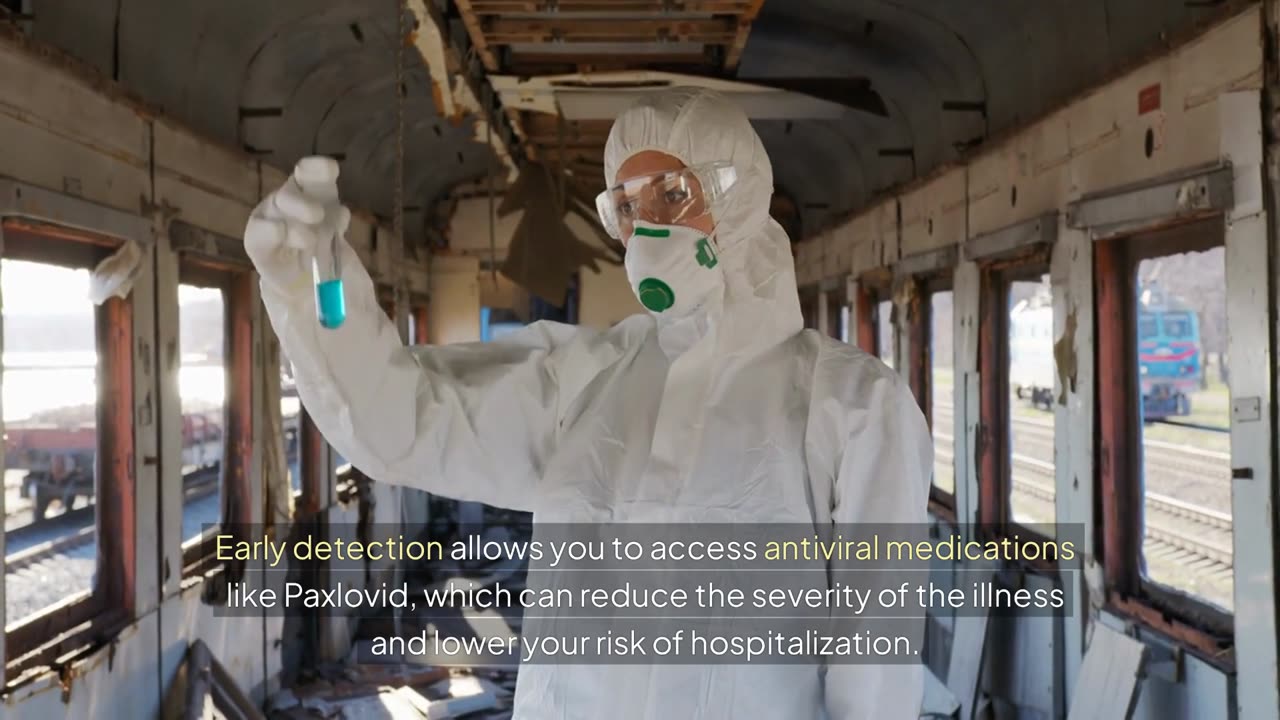Premium Only Content

he Next Wave of COVID Vaccines: What You Need to Know for Fall 2024**
**Title: T
**Introduction:**
As COVID-19 evolves from a pandemic to an endemic, the way we approach prevention and treatment is also shifting. With a new wave of updated vaccines on the horizon, many are wondering what this means for the upcoming fall and winter seasons. With cases rising this summer and new variants emerging, staying informed is more crucial than ever. Here's everything you need to know about the next generation of COVID vaccines and how to protect yourself as we enter the colder months.
**The Fall 2024 Vaccine Rollout: What’s New?**
### A Fresh Approach to Annual Vaccination
Just like the flu, COVID-19 has become a virus that we must keep up with on an annual basis. Each year, vaccines are updated to combat the most prevalent and dangerous strains circulating at the time. For Fall 2024, health officials have worked tirelessly to develop a new vaccine formula that targets the latest variants of COVID-19. According to the Food and Drug Administration (FDA), these vaccines are set to be available very soon—possibly within the next week.
These updated vaccines are crucial because they are designed to provide better protection against the strains of the virus that are currently most common. This means that even if you've been vaccinated before, getting the latest shot will help bolster your immunity and reduce your risk of severe illness.
### The Importance of Timing: Should You Wait for the New Vaccine?
If you're eager to protect yourself as soon as possible, you might be tempted to get a COVID vaccine immediately. However, experts advise holding off for the updated version if it’s just around the corner. Dr. Amesh Adalja, an infectious disease expert, suggests that waiting for the new vaccine is the best strategy. "The prior vaccine is not even being shipped anymore and is poorly matched to circulating variants," he explains. In other words, the newer vaccine will offer more effective protection against the current strains of COVID-19.
This updated vaccine will be available from major manufacturers like Moderna, Pfizer, and Novavax, and the Centers for Disease Control and Prevention (CDC) has already recommended it for everyone six months and older, with very few exceptions. So, if you're planning to get vaccinated, it's worth waiting just a little longer to ensure you're getting the most relevant protection.
**Navigating the New Normal: Updated Guidelines and What They Mean for You**
### Evolving Guidelines: What to Do If You Test Positive for COVID
The CDC has streamlined its guidelines to make it easier for everyone to follow, especially as COVID-19 moves into its endemic phase. Now, the focus is on what to do when you have symptoms of a respiratory virus, rather than just isolating based on a positive COVID test. The new guidance emphasizes staying home and away from others when you're feeling unwell, whether you have COVID, the flu, or another respiratory illness.
This shift away from the strict isolation rules of the pandemic era reflects the current state of COVID-19. With a large portion of the population having built up some level of immunity—either through vaccination or previous infection—the approach is now about managing symptoms and preventing the spread of all respiratory viruses, not just COVID-19.
### Treating COVID in 2024: When to Seek Medical Help
While many people who contract COVID-19 may only experience mild symptoms, it's still important to know when to seek medical treatment, especially if you're at higher risk. If you're over 50 or have chronic health conditions like heart disease, diabetes, or asthma, you may be eligible for antiviral medications like Paxlovid. These medications can significantly reduce the severity of the disease and lower the risk of hospitalization, but they need to be taken within the first few days of symptom onset.
The CDC recommends that people in high-risk categories get tested as soon as they start feeling sick. If you test positive for COVID-19, reaching out to your primary care doctor or visiting a Test to Treat center can help you access the medication you need to recover more quickly and avoid complications.
### Navigating Insurance and Vaccine Costs: What You Need to Know
One significant change this time around is that COVID vaccines are no longer universally covered by the federal government. This means that while most people with insurance, including Medicare, will still have access to free vaccines, those without insurance might face new challenges. The Bridge Access Program, which has provided free COVID vaccines to uninsured individuals, is set to end this month, adding another layer of complexity.
For those without insurance, it’s essential to check with local health departments or community health centers to find out where you can still receive a free or low-cost vaccine. Many pharmacies may also offer the vaccine at a reduced cost, so it’s worth doing some research to ensure you’re protected without breaking the bank.
**Looking Ahead: Preparing for Fall and Winter**
### The Role of Vaccination in Preventing a Winter Surge
As temperatures drop and people spend more time indoors, the spread of respiratory viruses like COVID-19 and the flu tends to increase. This makes the fall and winter months particularly critical for vaccination. By getting vaccinated now, you’re not only protecting yourself but also helping to reduce the overall spread of these viruses in your community.
Vaccination is one of the most effective tools we have to prevent severe illness and hospitalization, especially as new variants of COVID-19 continue to emerge. The more people who are vaccinated, the less likely it is that we will see a significant surge in cases this winter.
### Final Thoughts: Staying Vigilant in an Endemic World
As COVID-19 transitions from a pandemic to an endemic virus, it’s easy to become complacent. However, it’s important to remember that even though COVID is now more predictable and manageable, it’s still a serious illness that can have severe consequences, especially for vulnerable populations.
By staying informed about the latest vaccines, following updated health guidelines, and seeking medical care when needed, we can all do our part to keep ourselves and our communities safe. This fall, make sure you’re prepared by getting the updated COVID vaccine, and encourage your friends and family to do the same.
**Conclusion:**
As we continue to navigate this new phase of COVID-19, staying proactive about your health is more important than ever. The updated vaccines are just around the corner, offering the best protection against the latest variants of the virus. Make sure you're ready for the fall and winter seasons by getting vaccinated, staying informed, and following the CDC's guidelines for preventing the spread of respiratory viruses.
If you found this article helpful, please share it with your loved ones, and don’t forget to like, subscribe, and comment on our channel. Your support helps us continue to bring you the latest updates on health and wellness. Stay safe, stay informed, and take care of each other.
-
![[Stream #19 ] Gaming, Chatting, you know the drill!](https://1a-1791.com/video/s8/1/9/o/E/e/9oEeu.0kob-small-Stream-Sour-Pickle-100-Foll.jpg) LIVE
LIVE
OneRandomDolly
3 hours ago[Stream #19 ] Gaming, Chatting, you know the drill!
520 watching -
 11:07
11:07
TimcastIRL
1 day agoElon Musk Suggests He’ll BUY MSNBC, Joe Rogan Will REPLACE Rachel Maddow
49.6K48 -
 34:24
34:24
The Rubin Report
21 hours agoFormer CEO: The Aftermath of Vice Media & What's Next for Mainstream Media | Shane Smith
67.3K28 -
 9:14:23
9:14:23
tacetmort3m
1 day ago🔴 LIVE - BECOMING THE UNTOUCHABLE (RADIATION WHO?) - STALKER 2 - PART 3
23.2K4 -
 16:05
16:05
China Uncensored
17 hours agoAnother Car-Ramming Strikes Outside a Chinese School!
16.6K12 -
 9:26
9:26
Dr. Nick Zyrowski
8 hours agoAnti Inflammatory Foods | You MUST Eat These!
12.3K4 -
 15:40
15:40
Bearing
4 hours agoEnd Stage Trump Derangement | Rosie O'Donnell is NOT Doing Well 😬
13.9K69 -
 35:19
35:19
hickok45
7 hours agoSunday Shoot-a-Round # 256
22.3K26 -
 41:20
41:20
PMG
19 hours ago $0.95 earned"The No B.S. Guide to Getting Your Life together in 2024!"
14.4K -
 14:22
14:22
Forrest Galante
19 hours agoDoes The Megalodon Still Exist?
106K29